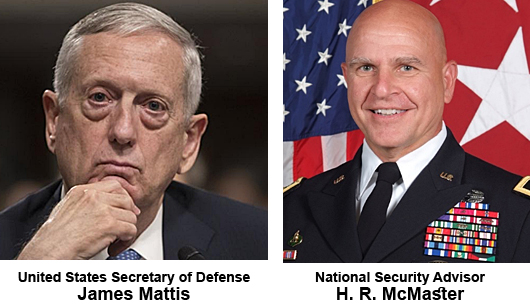Even If Large-Scale US Forces Can Beat ISIS – It Won’t Be Swift
Next week, US Secretary of Defense Gen. James Mattis is due to submit to President Donald Trump a Pentagon team’s review of US policy in Syria, with emphasis on recommendations for eradicating the Islamic State in its world centers.
This is intended to be achieved by a quick victory and a fast withdrawal, a mission that would call for the deployment of large-scale American ground, armored and air force personnel to the Middle East.
DEBKA Weekly’s military sources note that it would also necessitate the American military establishment’s abandoning the four concepts that dominated the US war on terror fought for sixteen years since 2001 and admit that they never worked.
1. Whenever Islamic terror organizations were defeated locally, such as in Afghanistan from 2001 and Iraq from 2006, they were succeeded by larger, more efficient and more murderous offspring.
2. The US-led multinational coalitions favored by former presidents ended up leaving the Americans more or less alone in the field, but for insignificant numbers of troops put up by a handful of reluctant partners.
3. Except for Jordan and in the last six months, Iraq, Washington was never able to assemble a bloc of moderate Sunni nations as allies in the pursuit of an ideological war on radical Islamic terror. The US and European countries were put in the absurd position of having to defend themselves against charges of declaring war on Islam.
4. US administrations’ huge investment in recruiting and training local armies to fight ISIS (Syrian, Iraq, Arab tribes and Kurds), during the five years since the radical jihadist terrorists moved into Iraq and Syria, never paid off and lacked the equipment for the task.
Therefore, if President Trump wants a quick in-and-out victory against ISIS, the only recourse is to deploy large numbers of American boots on the ground.
It is not worth counting on the Russians. They were able to accomplish complex military feats in the eighteen months of their major military intervention, largely by the effective use of modest military air power. But to avoid heavy casualties, they scarcely touched Islamic State forces.
For this reason, President Vladimir Putin even decided against an operation to recover the strategic town of Palmyra, which ISIS snatched back – even though holding this town would have gained the Russians a good vantage point for an assault on ISIS concentrations in the east and northeast, including Raqqa.
Regarding the input of the new US National Security Adviser Lt. Gen. H.R, McMaster, who was only appointed to the job Monday, Feb. 21, DEBKA Weekly’s military sources estimate that he is likely to join Gen. Mattis in recommending to the president that the US forces assigned to the war on ISIS in Syria be deployed outside that country. Their overriding advice would be to distribute this combat personnel among its neighbors, Iraq, Jordan, Israel, Lebanon – and possibly Turkey (see a separate article in this issue about the end of the Trump administration’s honeymoon with Ankara), for the following benefits:
- Protecting American contingents outside Syria would demand fewer personnel and might be delegated to local forces.
- From points outside Syria, American troops could jump across the border, carry out their missions and withdraw at speed to safety.
- If President Trump decided to realize his plan for safe zones in Syria, small US units parked just across its borders could move in and out for maintenance operations and so obviate the need for a large US troop presence.
- They would help secure their host countries against terror attacks, whether external or domestic.
- Their presence would serve additional US interests, such as, for instance, acting as a bulwark in Lebanon against a Hizballah takeover of central government in Beirut and the national army; or keeping the main highway linking Baghdad and Amman open and secure. The Jordanian treasury nets around $2bn a year from the movement of goods and customs dues along that highway. That sum is equal to the amount Jordan’s King Abdullah requested in US economic assistance from President Trump when they met in Washington earlier this month.
- They would stand in the way of attempts by Iran’s Revolutionary Guards and Shiite proxies to descend on Syria’s borders with Israel, Jordan and Iraq.
- Some of those countries already have US rear bases – another important saving. The injection of active US frontline units could contribute to the creation of the first moderate Sunni coalition for fighting the Islamic State, and so lend the war genuine ideological-religious substance.
A large part of the review will undoubtedly be classified and not released to the public. DEBKA Weekly’s military sources don’t envisage a US military victory over ISIS being achieved as speedily as President Trump would wish; or that American troops would return home quite so soon.


